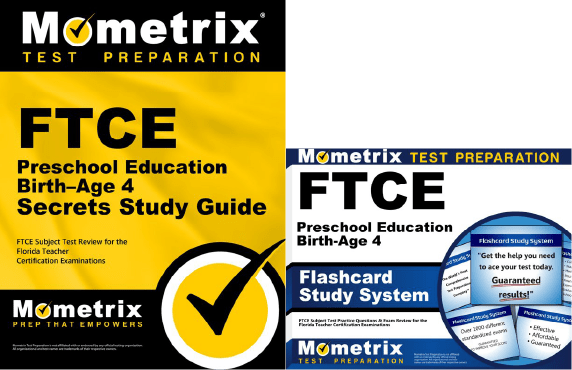If you need help studying for the FTCE Preschool Education (Birth-Age 4) test or just want some more information about what the test is like, you’ve come to the right place!
Click below to take a free FTCE Preschool Education practice test!
What’s on the Test?
The FTCE Preschool Education test contains 80 multiple-choice questions and the time limit is 2.5 hours.
The exam is split into nine competencies:
1. Typical and Atypical Early Childhood Development
11% of the exam
- Developmental domains
- Developmental sequences and milestones
- Indicators of atypical development
- Major influences on child development
- Factors that place a child at risk for developmental delay or disability
2. Early Childhood Foundations, Standards, and Professional Practices
10% of the exam
- Major historical theorists and theories in early childhood education
- Standards, policies, and law for early care and education
- Programs and organizations that provide services for young children and their families
- Roles, responsibilities, and ethical conduct of early care and education professionals
- Contemporary trends and issues in early care and education
3. Issues and Practices for Engaging Culturally Diverse Families and Communities
12% of the exam
- Ensuring fair and equitable practices with children and families
- Applying culturally responsive practices for encouraging family and community engagement in all aspects of early care and education
- Determining and analyzing barriers that may limit family access to high-quality care or services
- Incorporating family concerns, resources, and priorities
- Collaborating with program0based and community professionals
- Supporting the primary relationship between the family and the child
4. Curriculum and Developmentally Appropriate Practice
15% of the exam
- Differentiating among curriculum models
- Characteristics of an integrated curriculum
- Planning short-term and long-term goals
- Using technology as a resource to support children’s interests and exploration
- Promoting learning through visual and expressive arts
- Supporting adaptive skills
- Promoting physical development
- Promoting active learning through play
- Supporting the development of critical thinking and problem-solving skills
5. Developmentally Appropriate Learning Environments
10% of the exam
- Appropriate organization of indoor and outdoor space, equipment, and materials
- Providing a creative, engaging, and culturally responsive environment
- Differentiating among appropriate practices that accommodate various factors, skills, and abilities
- Determining appropriate schedules and routines for all learners
- Promoting effective teacher-child interactions
6. Developmentally Appropriate Guidance
12% of the exam
- Factors that influence a child’s emotional response to people, events, and situations
- Guiding and responding to children’s behavior
- The development of initiative and intrinsic motivation in children
- The collaboration of family, community, and early childhood personnel
- Building nurturing relationships between the child, caregivers, and peers
- Supporting self-regulation
- Promoting pro-social behavior
7. Children with Varying Exceptionalities and Special Considerations
10% of the exam
- Early intervention services and programs designed to meet the needs of children with exceptionalities and special considerations
- The components of parts B and C of the IDEA
- Common types of disabilities and disorders
- Appropriate screening and referral processes
- Assuring access for inclusion of children with exceptionalities
- Adapting the environment and curriculum to support meaningful participation
- Developing and implementing IFSP or IEP
8. Developmentally Appropriate Screening, Assessment, and Evaluation
10% of the exam
- Types and purposes of appropriate screening, assessment, and evaluation of all young children
- Formal and informal assessment strategies
- Analyzing and interpreting assessment data
- Approaches for involving all families in assessment processes
9. Health, Safety, and Nutrition
10% of the exam
- Types and symptoms of common childhood diseases and health concerns
- Universal precautions for disease prevention and control
- Facilitating the safety of young children
- Reporting child abuse and neglect
- Promoting wellness through healthy living and nutrition
How to Register
To get started with the registration process, you’ll need to create an FTCE/FELE account on their website. You can then register for the exam via your account.
The exam session is split into two sections, which you can take at the same time or on different days: the multiple-choice questions and the essay assignment.
The testing fee is $150.
How the Exam is Scored
The multiple-choice section of the FTCE Preschool Education test is scored using a scaled scoring method. Here’s how it works:
For every question you answer correctly, you get one point added to your raw score. At the end of the test, your final raw score will be converted to a scaled score.
The reason your raw score is converted to a scaled score is because everyone that takes the test is given a slightly different set of questions. Since everyone has a different arrangement of questions, and because some questions are harder than others, converting your raw score to a scaled score ensures a more even playing field.
FAQs
How many questions are on the FTCE Preschool Education exam?
The exam contains 80 questions.
What is the time limit for the FTCE Preschool Education exam?
The exam is timed at 2.5 hours.
What is the passing score for the FTCE Preschool Education exam?
You’ll need to get a final scaled score of at least 200 to pass.
How much does the FTCE Preschool Education exam cost?
The testing fee is $150.



 FTCE Study Guide
FTCE Study Guide FTCE Flashcards
FTCE Flashcards